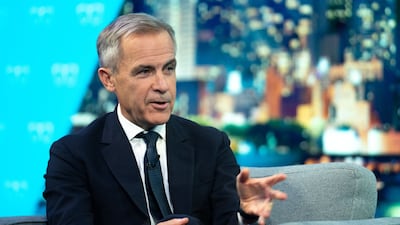UN special envoy on climate action and finance Mark Carney on Thursday said businesses must urgently step up the fight against climate change, but can use the lessons of the financial crisis to guide them.
He said the speed at which the global community is transitioning to a clean energy future has “gone up exponentially”.
“It really has moved particularly since the Glasgow [Cop26],” he said.
“That is true [but] it is also true that we’re running out of time and the consequences of running out of time appear worse.”
The former governor of the Bank of England was speaking at a webinar held by the Policy Institute at King’s College London.
Mr Carney explained why he has faith in businesses’ ability and desire to do the right thing.
The 2007-08 financial crisis revealed “some pretty deep cultural issues in markets” where business became “detached from the end users”, Mr Carney said.
He said he is a believer in “purpose to business”, providing solutions and not being disembodied from customers or suppliers.
On the climate front, he said firms have an opportunity to align more closely with their customers and producers.
He backed Pope Francis’ clarion call for urgent climate action.
He said the head of the Catholic Church is “absolutely” right to raise the alarm on global warming eight years after he issued a similar plea.
The Vatican this week published a new apostolic exhortation titled Laudate Deum, which means “Praise God” in Latin. In it, the pontiff called on world leaders to step up in the fight against climate change.
The Pope said the planet is moving towards a “point of no return” as global warming approaches the maximum recommended limit of 1.5C higher than the pre-industrial average.
“The anchor in terms of being at a climatic tipping point is absolutely right,” Mr Carney said.
'Carbon budget almost exhausted'
The Canadian economist, who governed the BoE from 2013 to 2020, cited Johan Rockstrom, director of Potsdam Institute for Climate Impact Research, to back up his point.
The Swedish scientist has been internationally recognised for his work on global sustainability issues.
“One of the things [Rockstrom] has taught me is as we’ve exhausted the carbon budget for 1.5C, almost exhausted it, we’ve also learned that the mapping of degree rises to extreme weather events has been worse than expected,” Mr Carney said.
“So that, plus the prospect of tipping points happening as well, and accelerating the process, means that there is a huge urgency.”
Laudate Deum, a 7,000-word package, was released on October 4, the feast of Saint Francis of Assisi, whose name the pope took when he was elected in 2013.
It came ahead of the Cop28 climate summit, which starts next month in the UAE, and followed on from Laudato Si, which means “Praise Be” in Latin, published in 2015. It was the first time in the church’s history that a papal letter to every Roman Catholic bishop addressed protection of the environment.
“Even if we do not reach this point of no return, it is certain that the consequences would be disastrous and precipitous measures would have to be taken, at enormous cost and with grave and intolerable economic and social effects,” Pope Francis wrote in Laudate Deum.
“Although the measures that we can take now are costly, the cost will be all the more burdensome the longer we wait.”


